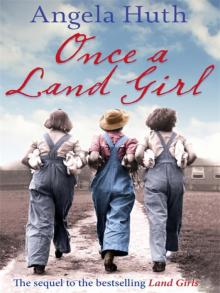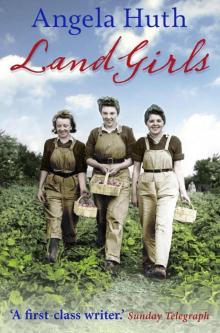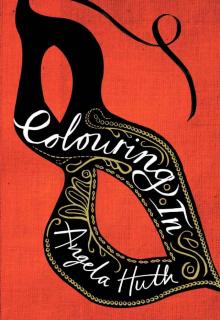- Home
- Angela Huth
South of the Lights Page 4
South of the Lights Read online
Page 4
‘I told you, Lark’s doing my hair tonight.’
Evans stepped back. His arms drooped, weighted by sad hands.
‘I told you I was coming to give you a lift home.’
‘You didn’t need to change your shirt for a lift.’
‘You could always change your mind, I thought.’
‘No. I’m not changing my mind.’
‘When we’re married, we’ll be together every evening.’
‘Well, we’re not married yet, are we?’
The flush which had cleared from Evans’s face returned. The crooning of the chickens seemed to swell a little as if in renewed and united indignation.
‘How’s Elizabeth?’ Evans asked quietly.
‘She’s very bad. She’s got worse all afternoon. She’ll be dead by this time tomorrow.’
‘Wilberforce can cope with that, can’t he?’
‘He can cope, but he’ll despise me for it. He’ll say if you take on a job looking after chickens, you should kill them like a man.’
‘Bastard,’ said Evans. ‘Tell you what. I’ll have a word with him if you like. After dropping you home. Save you having to be insulted. I’ll tell him to . . . finish her.’
Brenda was grateful.
‘Tell him top row, third from the end. He doesn’t even accept they have names. They’re just egg machines to him.’
‘All right.’
‘I don’t fancy her empty cage tomorrow morning.’
‘It’ll soon be filled.’
‘It won’t be Elizabeth.’
‘Come on. Let’s go.’
‘I’ll have to make Daisy queen.’
‘I’m sure she’ll be a good queen.’ One side of Evans’s mouth curled slightly.
‘Don’t laugh at me.’
‘I’m not laughing at you.’
Brenda followed Evans down the aisle of the shed. He had a narrow back, sloping shoulders. He dodged very slightly from side to side (hoping that Brenda wouldn’t notice) to make sure the heads that darted from the cages would not touch him. Brenda did notice.
‘They wouldn’t bother to peck you.’ She stopped at Elizabeth’s cage. ‘Look at her.’ Evans turned, noted the dying eyes. ‘You better say goodbye to her.’ Brenda waited, staring at him. ‘Go on. Say goodbye. Or can’t you bring yourself to that?’
For the third time Evans blushed.
‘Goodbye, Elizabeth,’ he said. His voice was foolish.
‘Goodbye Queen Elizabeth,’ Brenda repeated. ‘Though goodness knows you’re not much of a queen now.’ She tapped the bird’s beak with her nail. The head swung a little to one side, too weak to return to its former position.
Outside the light was blindingly gold after the shadows of the shed. There was a distant smell of fresh manure, a slight breeze.
‘You’re insensitive to death, plainly,’ said Brenda.
‘I’m not insensitive to death.’
‘It doesn’t matter to you if an animal you love dies.’
‘Of course it does.’
‘You think I’m just sentimental, feeling like this about Elizabeth.’
‘I don’t. You know I’ve always been impressed, such affection for hens.’ Brenda glanced at him, moving a little way from him in case he should take her arm. He walked looking at the ground, frowning. ‘Anyhow, when we’re . . . when we’ve got our own place and you have all the hens you want, we’ll see to it they have a good life. We’ll see to it they live a long time.’
Brenda shrugged. So often, in his well meaning way, Evans was nothing but irritating. He could not see that the thought of future hens was no consolation for Elizabeth’s death. He could not understand the ache of an empty cage. By day, it seemed, Evans could understand practically nothing. Only at night, in the dark, in the hay, he instinctively knew what she wanted. Then, they didn’t have to talk, and that was best. One day she would have to sit down and think, really think, whether she could continue her life with Evans for the sake of the nights. Lark would advise. Lark was good with advice. For the moment, all that mattered was that the next time she walked down this path, early tomorrow morning, the dry smell of pig feed in the air, Elizabeth would be dead. She said nothing. To Evans, there was nothing further to say.
Brenda hurried straight into Lark’s room without knocking. Lark was lying on her bed, newly painted geranium nails pointing to the ceiling. The wallpaper was dense trellis-work through which trailed scarlet and pink flowers, mostly geraniums. The window ledge was crowded with pots of the real thing. On the small table by Lark’s bed stood a dozen small, spiteful cacti. ‘My protection,’ she called them. Summer evenings, warm with western sun, the room felt like an indoor garden, though it smelt of nail polish.
‘The queen’s dying,’ said Brenda.
Lark sat up at once.
‘Oh, Lord. Don’t look so tragic. Wilberforce’ll see to it, like he did to the others, won’t he?’
‘But he doesn’t even know she’s queen.’
Lark shrugged.
‘Some people are that callous. Well, we must do something to take your mind off it.’ Lark was practical about happiness. ‘We’ll have a nice supper of poached eggs on sweet corn, your favourite, and gin. There’s half a bottle, so we won’t need to stint ourselves. Then we’ll get on with the patchwork.’ They were making a patchwork tablecloth, all red materials, for Lark’s widowed mother who lived with her arthritis in Westgate-on-Sea. ‘There’s Mahler on Radio 3, so we can listen to that and put brandy in our cocoa.’
Brenda had never heard of Mahler and was unskilled at sewing: Lark completed three hexagonals to her one. But the positive suggestions calmed her. She only had to knock at the door of Lark’s small red world to be let in, comforted, eased.
‘Come on,’ said Lark, going to the door. ‘First things first. Gin.’ There was a ladder in her tights, a hole in the elbow of her grey jersey, her greasy hair fell into partitions. She bounced. If Brenda could have thought of a good way to put it she would have liked to have told her, to have paid her a compliment: Lark, you’re strong, she would have liked to have said.
Rosie divided the bacon and egg pie in her mind. She calculated that if she took a smallish piece herself – and she never liked to appear a greedy eater in public, though one of her secret foibles was to pick at things in the larder – then they would just manage. It was really most difficult of Evans, being so vague about his evening plans. If only he had said yes quite definitely, then Rosie could have made a stew: but if he was going to be out, then it would be silly, all that meat and potatoes just for Henry and her. Rosie didn’t like waste, but she also didn’t like to inflict such worries upon her family. Therefore she struggled by herself, measuring out the pie with a knife, the inspiration of a tin of new potatoes in the back of her mind in case Evans did return. Would he, wouldn’t he? The question rattled at her. He had come in and put on a clean shirt – she had only pressed it that morning, was worried whether it might not still be damp – and hurried out saying he might be back and he might not. The trouble was, and Rosie would admit this to no one in the world, Brenda had a terrible hold on Evans. He ran round her in circles, doing everything she required and more. He wouldn’t hear a word against her: she was his life. Rosie had thought that once they were engaged, officially, things might have been different. But they weren’t. Brenda continued to have the upper hand, anyone could see that. What’s more, she had no sense of romance. Conversations about their new home seemed to bore her. Everything seemed to bore her except her blooming chickens, and they were a funny hobby for a girl, weren’t they? In her heart, Rosie worried for her son. Even now, as she took the risk and opened the tin of potatoes, she felt a twist of anxiety in her stomach. Don’t be a fool, Rosie Evans, she said to herself at once. Many’s the time you’ve seen them go out together in the Mini, all smiling, off for a picnic somewhere, taking the rug and the basket of sandwiches in the back seat. Maybe alone they were all right. They must be, or Evans wouldn’t stick around so l
ong, would he? Not her Evans. He’d have more sense.
Rosie took a bunch of knives and forks to the table. She smoothed the white damask cloth just for the pleasure of feeling the silky knots of delphiniums, embroidered by her mother fifty years ago, beneath her hands. In the summer evening light that made their kitchen a smaller, huskier room, Rosie noticed her hands didn’t look so bad, vulnerable though they were on the whiteness of the cloth. Nothing could take away from their shape – huge boxes, they were, Henry had once said, daft at the end of small arms like hers – but the warmth of the day had muted their colour. They were still a reddish mauve – nothing on earth would pale their skin to the white of the rest of the body – but at least the ugly mottles, so sharp in winter that the skin resembled tortoiseshell, had subsided for a few months. Rosie would have liked to call Henry’s attention to the fact they were better today: funny how he only commented on them when they were at their worst. But Henry was deep in his paper again. Henry was a very thorough reader of papers, though usually he didn’t spend quite so many hours over the Daily Mirror as today. Rosie thought it must be the heat playing havoc with his concentration. She herself had to read more slowly in the heat, so she understood. She kept her silence, and moved the egg cup, holding its one iris, a fraction of an inch nearer the centre of the table. Odd how one bloom could give so much pleasure. Evans often criticised her for being so mean with flowers, in the friendliest possible way, of course, just teasing. What she couldn’t make him understand was the lesson she herself had learnt from a calendar of Japanese flower arrangements: how beautiful are just one or two blooms rather than a whole lot bunched together. Admittedly, she didn’t have the right kind of vases, the kind in the colour photographs. And there were no exotic lilies in these parts, not even in the local florist’s, to work with. So Rosie adapted in her own way: a single iris, a bunch of fuschia and two buttercups, a strand of ivy or honeysuckle bending wispily from a milk bottle. Strange, really, how her arrangements had never achieved so much as a highly commended in the local flower show. But she understood why it was. Even in the world of flowers, the British were so insular: they would never look to arrangements beyond their own shores. Still, now we were in the Common Market, there was some hope. Now we had accepted Europe we might be persuaded to open our eyes further east and glance upon, and one day even seize upon, the Japanese way with apple blossom. That would be the day. For the moment, Rosie’s arrangements were too far ahead of their time for the village. But, with faith in her theory, she was prepared to wait, quite patiently. She touched the blue petals with a gentle finger, and smiled to herself.
Evans came in. Henry turned a page of his paper.
They sat at the table, eating. As Rosie always helped the men to their food she had managed to divide the pie fairly between them, and disguise her own narrow wedge with a margin of potatoes. Henry held his knife like a hammer. Rosie could never feel quite happy about this particular habit of his, but in weighing it up over the years she had decided it was one of those things not worth mentioning. Even after three decades of love there are areas which must be left untouched, protected by silence. Evans ate with more refinement than his father, but drank his tea fast and noisily, treating it like beer. Rosie wondered how he managed not to burn his mouth, and what had happened between him and Brenda to cause his return. He had obviously been to see her down at the sheds, judging by the faint smell of chickens.
‘Busy day?’ she asked.
‘Fairly. A lot of parcels.’
‘People must be posting early for Christmas, thinking it’s going up again.’
‘That’s what Brenda said.’
‘Brenda all right?’
‘Fine.’
‘I thought she looked very nice, Sunday, that skirt.’
‘Yes.’
‘Perhaps you’d both like to bring Lark with you to tea this Sunday? I always think she has such a quiet life, Lark.’
‘She’s happy enough. I’ll ask her. She’s washing Brenda’s hair tonight.’
Any news of Brenda’s innocence in Evans’s absence filled Rosie with a sense of private relief. Relief that made her almost skittish.
‘Henry, love, you funny old thing, you’ve left all your nice pie,’ she observed.
‘Not hungry.’ Henry was scratching his neck, all around the inside of his collar. In an ideal world, the sort of gesture that Rosie would have preferred him to carry out in the privacy of the bathroom rather than at table.
‘But you always have an appetite for your tea.’
Henry stood up.
‘I’m off down to the Star for an hour.’
‘But it isn’t your night for –’ Rosie stopped herself. She would never wish to be accused of criticism. She watched him go, decided not to shout out to him he’d forgotten his jacket.
‘The heat doesn’t suit your father,’ she said to Evans when Henry had slammed the door.
‘Dad’s never liked the heat.’
Evans helped Rosie clear away the plates. Then he, too, more gently, said he was going out. Once again Rosie controlled herself not to ask questions. The odd departures of the men in your family, with no explanations, was part of the lot a wife and mother should bear without apparent worry. She managed a smile.
‘Have a nice time.’
But she did wish Evans wasn’t so weak where Brenda was concerned. He should leave her alone, hair-washing nights. Not always be after her, always there. A small dose of doubt would do a girl like her a power of good. If she didn’t have it all quite so easy she might be inclined to come running. That would be much better than things as they were now – Evans, in his kindness, always the one chasing after her.
After a small battle with himself Evans came to a decision: he would not go to Brenda. The firmness of his purpose made him free to leave the house. He was in no mood tonight to be left alone with his mother’s subtle sympathy. He wanted merely to walk, he needed air. Space, he required, in which to think. Quietness, to quell the turmoil in his blood.
He looked up at the elms, a deeper evening green now, and then towards the ugly shape of the vicarage. Behind their surplice curtains Evans could make out the shapes of the vicar and his wife at supper. Then the church bells began to ring: choir practice night. With a reverent little jump the vicar rose from the table, mistily as the Holy Ghost. In a moment he would be at the front door, hurrying with shining face to the church. Evans had no wish to meet him. Rather than turn back into the kitchen, he quickly crossed the small patch of common land between the cottages and vicarage and went through the front gates of Wroughton House. There, he hid behind the fence.
From his protected position he watched the vicar make his eager way to the graveyard. An encounter had been missed by seconds. Evans’s heart beat fast with unholy gratitude. He leaned against the trunk of one of the elms – they grew both sides of the fence – feeling the deep ridges of its bark cutting into his back. The four desolate bells repeated over and over again their monotonous descending scale. He was vaguely aware that technically he was trespassing, that he was on private property, but he didn’t care.
Moments went by. Evans edged round the trunk of the tree, looked up the drive towards the house. Elms grew each side of the drive. They protected the church on the right, fields on the left. In the distance Evans could see a small part of the façade of the house.
There was no one about. He began to walk, stopping only when he came to the large pond at the end of the front lawn. It was a man-made pond, perfectly round and lined with cement, crowded with water-lilies and bulrushes. Behind it, dividing the lawn from the fields, grew a vast willow tree whose meandering boughs dipped and swayed almost continuously. Some of its lower fronds ruffled the brown pond water. Suddenly aware of his exposed position in the drive, Evans went to hide again, behind the willow tree. There, hands in pockets, legs set apart in a comfortable position, he contemplated the house once more. His heart had resumed its normal beating, the church bells had stopped ringing.
They left a profound silence in their wake. A silence which dissolved his guilt at trespassing. Hidden as he was, he felt at peace in the garden.
In all his life in the village Evans had never really looked at Wroughton House before. It was protected from the rest of the community by its fences and tall trees, an impenetrable oasis among the new houses surrounding it. The only previous times he had walked up the drive had been to accompany Rosie to the annual summer fete on the lawn. Those occasions Evans remembered with little pleasure. Rosie insisted he toured the rose garden with her, and he could never think of any compliments to pay flowers, especially with the British Legion silver band blasting in his ears. He could never understand Rosie’s awe of the place; but then he supposed it was to do with the fact that her mother had been a housemaid there after the First World War, and had married the under gardener. It was his own grandfather who had planted most of the bloody roses – a fact which left Evans quite unmoved, year after year, as Rosie repeated the story. She herself had never worked permanently in the house, though up until last year she was often called upon to help out at weekends. These invitations caused her a dither of excitement and pleasure. She would come back with stories of parties which held so little interest for Evans he scarcely listened and, now he tried to remember, he could recall no details. But he was aware that things had changed: that Mrs Browne, the owner, lived by herself now because Mr Browne had left. There were no more parties. Evans overheard gossip in the pub, but did not take it in. He had only seen Mrs Browne on a few occasions, darting about in a silver car. Smallish, not his sort of woman. For one who had lived all his life so near the house and its inhabitants, he was curiously uninformed.
Evans, who would never call himself a keen observer of fine buildings, continued to stare at the house. He supposed it was what people who knew about architecture would call beautiful – built in the time of William and Mary, he remembered his mother saying. It was very grand by his standards, the grandest house he had ever seen. But not intimidating. He would not be afraid to knock at the front door. He liked the way its tall windows reflected the pale flecks of late evening sky; the way its roots were settled in a wave of bushy lavender. He liked the colour of its walls – an irregular ochre, something like a winter beach he had once visited, buffetted to varying shades by the wind. A strange excitement came upon him. He was aware he was experiencing one of those moments that make an ordinary day a memorable one. He would have liked to wander round the rest of the garden and take a look at the sides and the back of the building. But the church bells started up again, reminding him he should not be there at all, jarring his conscience. Reluctant to move, he cast his eyes to the pond, where the water image of the façade hung absolutely still. A light went on in one reflected window. Glancing back at the house, Evans saw a woman standing there. She pulled down a blind. It was then he remembered: the house was for sale. His mother had been talking about it only yesterday. Mrs Browne was staying on alone until it was sold. The woman at the window must have been Mrs Browne.

 Sun Child
Sun Child South of the Lights
South of the Lights Virginia Fly is Drowning
Virginia Fly is Drowning Of Love and Slaughter
Of Love and Slaughter Such Visitors
Such Visitors Once a Land Girl
Once a Land Girl Land Girls
Land Girls Colouring In
Colouring In Nowhere Girl
Nowhere Girl Monday Lunch in Fairyland and Other Stories
Monday Lunch in Fairyland and Other Stories Another Kind of Cinderella and Other Stories
Another Kind of Cinderella and Other Stories Invitation to the Married Life
Invitation to the Married Life Easy Silence
Easy Silence